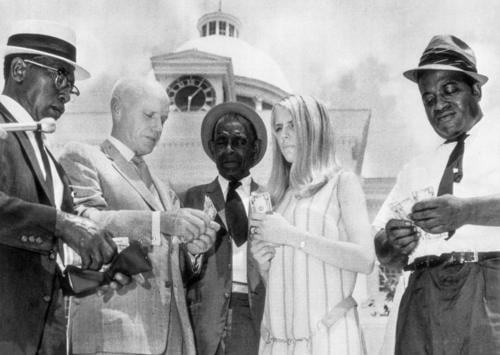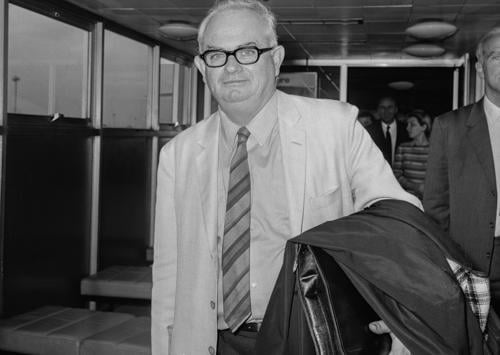Listen to New Voices on Studs Terkel our partnership with 826CHI-here! Read the Story
Showing 1 - 15 of 774 results
-
Win Stracke, Bill Adelman, and Bill Neebe discuss May Day and the Haymarket Square Riot
Apr. 29, 1976 Win Stracke, Bill Adelman, and Bill Neebe discusses the Haymarket Riot and the following trials and hangings which changed the labor movement around the world. The group discusses the American labor movement and police brutality that led to the protest and the eventual accusal of eight men. They also explore the roles George Pullman, Marshall Field, and the police force played and how they used the protest to weed out union leaders they did not like. The group briefly discusses the future of the labor movement.
-
William Stringfellow discusses the book "The Christian Ethic"
Nov. 8, 1973 William Stringfellow discusses the book "The Christian Ethic." Includes passages from the book.
-
William Sloane Coffin and Jim Bowman discuss religion during the Vietnam War
William Sloane Coffin and Jim Bowman discuss history, religion, and the impact of the Vietnam War. Content Warning: This conversation includes racially and/or culturally derogatory language and/or negative depictions of Black and Indigenous people of color, women, and LGBTQI+ individuals. Rather than remove this content, we present it in the context of twentieth-century social history to acknowledge and learn from its impact and to inspire awareness and discussion.
-
William Shirer discusses his book “Twentieth Century Journey: 1930-1940: Volume II”
Jun. 1, 1984 Discussing the book "Twentieth century journey: 1930-1940" with the author William Shirer.
-
William Shawcross discusses his book “Sideshow: Kissinger, Nixon and the Destruction of Cambodia”
May. 25, 1979 Investigative journalist William Shawcross speaks with Studs Terkel about Cambodia, Henry Kissinger, and Shawcross’ book, “Sideshow: Kissinger, Nixon and the Destruction of Cambodia.” Both Terkel and Shawcross read excerpts from Shawcross’ book and Terkel reads an excerpt from an interview Henry Kissinger did with reporter Theo Summer.
-
William Least Heat-Moon discusses his book "PrairyErth: (A Deep Map)"
Nov. 5, 1992 Discussing the book "Blue highways: a journey into America" with William Least Heat Moon.
-
William Hosukawa and Robert Wilson discuss their book "East to America"
Oct. 28, 1980 Where as the Japanese inherited jobs that the Chinese had, the Japanese also inherited many of the prejudices. William Hosukawa and Robert Wilson's book, "East to America: A History of the Japanese in America" also covers the internment of Japanese Americans. Hosukawa said it's important to understand that we're all immigrants of sorts and that the Japanese have made a contribution to the greatness of this country.
-
William Craig talks to Studs Terkel
William Craig discusses his book "The Fall of Japan: The Final Weeks of World War II In the Pacific." He speaks mostly on the atomic bombings of Hiroshima and Nagasaki. Includes several excerpts from the book.
-
William Bradford Huie talks with Studs Terkel
Mar. 29, 1967 William Bradford Huie discusses his novel The Klansman. Includes recordings of interviews from Rev. Paschal Carlton, an unknown Alabama cab driver, and an unknown woman of Birmingham, Alabama. Includes songs "Be A Man, Join the Klan," and "Move Them Niggers North."
-
William Appleman Williams talks with Studs Terkel
Feb. 12, 1965 Discussing "Great Evasion" and interviewing historian William Appleman Williams.
-
Willard Van Dyke discusses American history and its effects on the film, photography, and the arts
Apr. 3, 1985 Willard Van Dyke, cinematographer and co-director of documentaries like "The City" and "The River," talks about 20th century American history and how it effected the arts. Using his documentaries and other artists' work, he explores how the Great Depression, World War II, and the Cold War changed American art and culture. He discusses Public Works of Art, war propaganda, and McCarthyism and their challenges for artists. Near the end of this interview, Van Dyke discusses the changes in modern still photography and documentaries as Americans forget history.
-
Will D. Campbell discusses his book "Providence"
Aug. 26, 1992 Content Warning: This conversation includes racially and/or culturally derogatory language and/or negative depictions of Black and Indigenous people of color, women, and LGBTQI+ individuals. Rather than remove this content, we present it in the context of twentieth-century social history to acknowledge and learn from its impact and to inspire awareness and discussion. Will D. Campbell, minister, activist, and author of “Providence," discusses religion, civil rights, and American history.
-
Will Campbell discusses his book “Forty Acres and a Goat: A Memoir”
Feb. 13, 1987 Preacher Will Campbell discusses and reads from his book “Forty Acres and a Goat: A Memoir” and recounts his experience during the Civil Rights movement in the South. Studs plays “His Eye Is On The Sparrow” - Mahalia Jackson (1958).
-
Wilfred Burchett discusses about his career on journalism
Oct. 24, 1977 Wilfred Burchett (an Australian journalist) discusses his journalism career. He was reporting conflicts in Asia (North Korea, Vietnam, China and Japan) and their Communist supporters. He speaks briefly about his experiences in Nazi Germany and concentration camps. Towards the end of the interview he talks about his interest in learning and reporting more about the new euro-communism (prominent in Italy, Spain and France).





